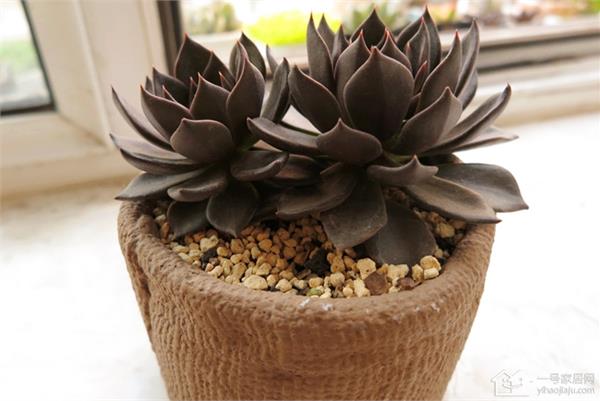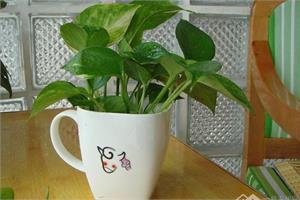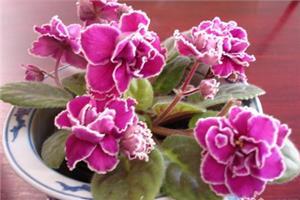What is the Black Prince and how to plant it well?
The Black Prince is very eye-catching because of his perfect rosette leaf plate and its special leaf color. The cultivation and reproduction of the Black Prince is easy, and it is a good product for family potted plants. Let's take a look at the knowledge of the Black Prince.

Introduction of the Black Prince
The Black Prince is a perennial succulent herb of the genus Euphorbiaceae. It's a cultivated variety. The shape of the rosette plant is the same as that of the common stone lotus. The plant has a short stalk, the fleshy leaves are arranged into a standard rosette, and the leaves are spoon-shaped and slightly thick. when the growth is exuberant, the upper leaves of the plant are more than 100, and the plant width is more than 20 cm. There is a small tip at the top, the leaves are black and purple, and the leaves near the growing point are dark green when the light is insufficient.
Second, the morphological characteristics of the Black Prince.
The Black Prince is a cultivated variety. The plant has a short stalk, fleshy leaves are arranged into a standard rosette-shaped, when the growth is exuberant, the diameter of the leaf disk can reach 20 meters, the leaf is spoon-shaped, slightly thick, the tip has a small tip, and the leaves are black and purple. Cymes of the Black Prince, florets red or purplish red. The shape of the rosette plant is the same as that of the common stone lotus. The spoon-shaped leaves are thicker. When the growth is exuberant, the upper leaves of the plant are more than 100, and the width of the plant is more than 20 cm. The leaves are dark purple and dark green near the growing point when the light is insufficient. The Black Prince blossoms in summer and autumn.
III. The ecological habits of the Black Prince
The Black Prince has a strong habit. Although there is a short dormant period in summer, it is not difficult to save water with a little shade and ventilation. Early spring and autumn are prosperous periods of growth, and liquid fertilizer can be applied. The potted soil should not be too dry, or the old leaves will wither. General garden soil can be used for planting. Reproduction can cut the top to give birth to tiller buds, but also can be propagated by leaf insertion, and the success rate is much higher than that of ordinary stone lotus. Black Master and Black Prince are both cultivated varieties, their habits are basically similar, both like warm, dry and sunny environment, drought-resistant, not cold-resistant, slightly resistant to semi-shade.
The plant has a short dormant period at high temperature in summer, when the plant growth is slow or completely stagnant, can be maintained in a well-ventilated place to avoid long-term rain, and slightly shaded, controlled watering, and do not apply fertilizer. Spring, autumn and early summer are the main growing periods of the plant, which should be given sufficient sunlight. Although it can grow in the semi-shade, it will become dark green near the growing point, and the dark purple of the leaves in other parts will also become light brown, affecting ornamental. In addition, excessive nitrogen fertilizer in the soil and overgrowth of plants will also cause this phenomenon.
Therefore, usually make the pot soil a little drier, let the plant grow a little slower but will get a better effect. In winter, if the lowest temperature is not less than 10 ℃, it can be watered normally to make the plant continue to grow, but there is no need to apply fertilizer; if it can not maintain such a high temperature, control watering and make the plant dormant, it can also withstand the low temperature of 3 ℃ and 5 min. When the basin is changed every 1-2 years, the basin soil is required to be fertile and has good drainage. 2 parts of coarse sand or vermiculite, 1 part of rotten leaf soil and 1 part of garden soil are often used after mixing. If an appropriate amount of plant ash or bone powder is added as base fertilizer, the effect is better.
Relatively speaking, the Black Prince is strong, and the management can be a little more extensive. During the dormant period in summer, Master Hei should pay attention to control watering so as not to cause rotten roots because the soil is too wet. In winter, due to less light, the leaves will turn green, especially the new leaves, which are more obvious, but you don't have to worry about it. After the arrival of spring, with the increase of light, it will gradually turn black and purple.
IV. Cultivation techniques of the Black Prince
The Black Prince has a short dormant period when the plant is at high temperature in summer, when the plant growth is slow or completely stagnant, can be maintained in a well-ventilated place to avoid long-term rain, and slightly shaded, controlled watering, and do not apply fertilizer. Spring, autumn and early summer are the main growing periods of the plant, which should be given sufficient sunlight. Although it can grow in the semi-shade, it will become dark green near the growing point, and the dark purple of the leaves in other parts will also become light brown, affecting ornamental. In addition, excessive nitrogen fertilizer in the soil and overgrowth of plants will also cause this phenomenon.
Therefore, usually make the pot soil a little drier, let the plant grow a little slower but will get a better effect. In winter, if the lowest temperature is not less than 10 ℃, it can be watered normally to make the plant continue to grow, but there is no need to apply fertilizer; if it can not maintain such a high temperature, control watering and make the plant dormant, it can also withstand the low temperature of 3 ℃ and 5 min. When the basin is changed every 1-2 years, the basin soil is required to be fertile and has good drainage. 2 parts of coarse sand or vermiculite, 1 part of rotten leaf soil and 1 part of garden soil are often used after mixing. If an appropriate amount of plant ash or bone powder is added as base fertilizer, the effect is better. Relatively speaking, the Black Prince is strong, and the management can be a little more extensive.
Fifth, the function and use of the Black Prince
1. Ornamental value
The Black Prince's perfect rosette leaf plate and special leaf color make it highly ornamental and eye-catching. The Black Prince is shaped like a black lotus flower, giving people a sense of nobility and bright colors. It is a kind of succulent plant with good flowers and leaves. With unique shape and beautiful leaf color, it is very suitable for family cultivation.
two。 Potted plant effect
The Black Prince is easy to cultivate and breed, and it is a good product for family potted plants.
The above is the knowledge of the Black Prince. I hope I can help you.
Related
- Wuhan Hospital Iron Tree Blooming Result Was Instantly Frightened by the Gardener Master
- Which variety of camellia is the most fragrant and best? Which one do you like best?
- What is the small blue coat, the breeding methods and matters needing attention of the succulent plant
- Dormancy time and maintenance management of succulent plants during dormancy
- Minas succulent how to raise, Minas succulent plant pictures
- What are the varieties of winter succulent plants
- How to raise succulent plants in twelve rolls? let's take a look at some experience of breeding twelve rolls.
- Attention should be paid to water control for succulent plants during dormant period (winter and summer)
- Watering experience of twelve rolls of succulent plants
- Techniques for fertilizing succulent plants. An article will let you know how to fertilize succulent plants.



